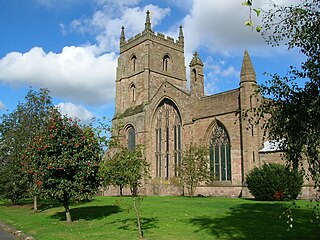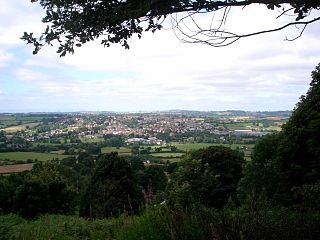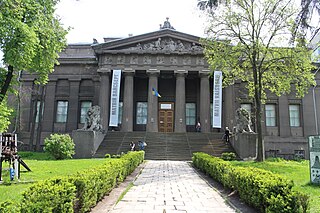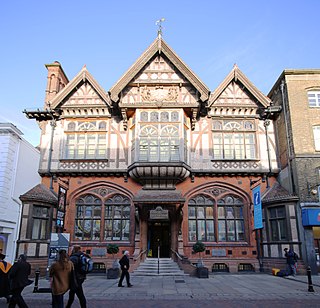
The Ashmolean Museum of Art and Archaeology on Beaumont Street, Oxford, England, is Britain's first public museum. Its first building was erected in 1678–1683 to house the cabinet of curiosities that Elias Ashmole gave to the University of Oxford in 1677. It is also the world's second university museum, after the establishment of the Kunstmuseum Basel in 1661 by the University of Basel.

Leominster is a city in Worcester County, Massachusetts, United States. It is the second-largest city in Worcester County, with a population of 43,222 at the 2023 census. Leominster is located north of Worcester and northwest of Boston. Both Route 2 and Route 12 pass through Leominster. Interstate 190, Route 13, and Route 117 all have starting/ending points in Leominster. Leominster is bounded by Fitchburg and Lunenburg to the north, Lancaster to the east, Sterling and Princeton to the south, and Westminster to the west.

Frederic Leighton, 1st Baron Leighton,, known as Sir Frederic Leighton between 1878 and 1896, was a British Victorian painter, draughtsman, and sculptor. His works depicted historical, biblical, and classical subject matter in an academic style. His paintings were enormously popular and expensive, during his lifetime, but fell out of critical favour for many decades in the early 20th century.

Leominster is a market town in Herefordshire, England; it is located at the confluence of the River Lugg and its tributary the River Kenwater. The town is 12 miles north of Hereford and 7 miles south of Ludlow in Shropshire. With a population of 11,700, Leominster is the largest of the five towns in the county; the others being Ross-on-Wye, Ledbury, Bromyard and Kington.

Bromyard is a town in the parish of Bromyard and Winslow, in Herefordshire, England, in the valley of the River Frome. It is near the county border with Worcestershire on the A44 between Leominster and Worcester. Bromyard has a number of traditional half-timbered buildings, including some of the pubs; the parish church is Norman. For centuries, there was a livestock market in the town.

Herefordshire is a ceremonial county in the West Midlands region of England. It is bordered by Shropshire to the north, Worcestershire to the east, Gloucestershire to the south-east, and the Welsh counties of Monmouthshire and Powys to the west. The city of Hereford is the largest settlement and the county town.

The National Portrait Gallery (NPG) is an art gallery in London that houses a collection of portraits of historically important and famous British people. When it opened in 1856, it was arguably the first national public gallery in the world that was dedicated to portraits.
Herefordshire Council elections are held every four years. Herefordshire Council is the local authority for the unitary authority and ceremonial county of Herefordshire in England. Since the last boundary changes in 2015, 53 councillors have been elected from 53 wards.

North Herefordshire is a constituency represented in the House of Commons of the UK Parliament since 2024 by Ellie Chowns of the Green Party of England and Wales. It is the first Green seat in the West Midlands region.

The National Art Museum of Ukraine is a museum dedicated to Ukrainian art in Kyiv, Ukraine.

Sir Thomas Coningsby was an English soldier and Member of Parliament, notable for his diary of military action in France in 1591, and his feuds over local representation in Herefordshire.

John Scarlett Davis, or Davies, was an English landscape, portrait and architectural painter, and lithographer.

The Beaney House of Art and Knowledge is the central museum, library and art gallery of the city of Canterbury, Kent, England. It is housed in a Grade II listed building. Until it closed for refurbishment in 2009, it was known as the Beaney Institute or the Royal Museum and Art Gallery. It reopened under its new name in September 2012. The building, museum and art gallery are owned and managed by Canterbury City Council; Kent County Council is the library authority. These authorities work in partnership with stakeholders and funders.

The Hereford Museum and Art Gallery is a museum and art gallery located in the cathedral city of Hereford, Herefordshire, England.

The Museum of Gloucester in Brunswick Road is the main museum in the city of Gloucester, England. It was extensively renovated following a large National Heritage Lottery Fund grant, and reopened on Gloucester Day, 3 September 2011.

Carl Randall is a British figurative painter, whose work is based on images of modern Japan and London.
John Hungerford Arkwright was Lord Lieutenant of Herefordshire from 27 January 1902 to 5 December 1904, and was one of the wealthiest landowners in that county.

Stephanie Deshpande is a contemporary American painter, best known for her portraits and narrative paintings. She currently lives in northern New Jersey.

The Saddleworth Museum is a local history museum in Uppermill, Saddleworth, West Yorkshire, England. Founded in 1962, the museum is housed in the remains of the 19th-century Victoria Mill and its collections showcase the history of Saddleworth.



















